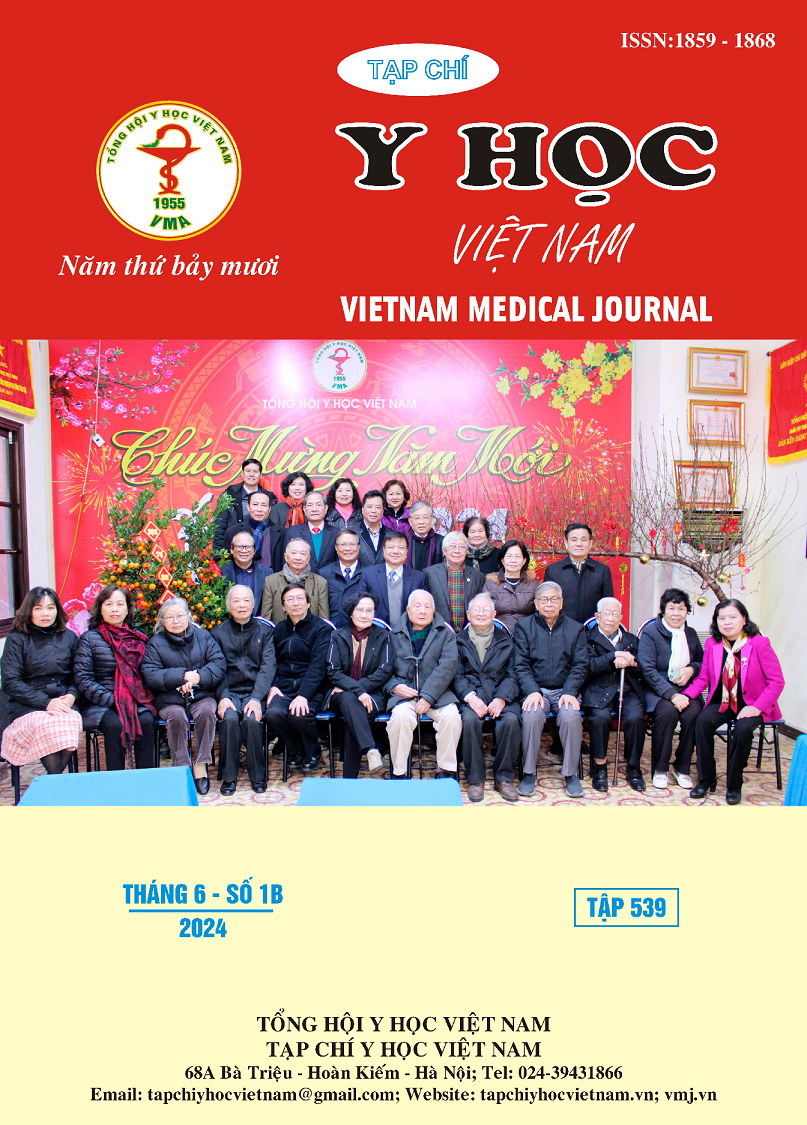STUDYING THE VARIATION OF BLOOD GLUCOSE IN THE EARLY POST-RENAL TRANSPLANT AND ITS RELATIONSHIP TO PRE-RENAL TRANSPLANT IMPARED GLUCOSE TOLERANCE
Main Article Content
Abstract
Objectives: To evaluate the variation of blood glucose in the early period (≤ 45 days) after kidney transplantation and the relationship to impaired glucose tolerance before kidney transplantation. Method: This study was a descriptive study, longitudinal follow-up of 100 kidney transplant patients from living donors at 103 Military Hospital from March 2023 to December 2023, with a post-transplant follow-up period ³ 1,5 months. Results: The incidence of patients with impaired fasting blood glucose before transplantation, impaired glucose tolerance before transplantation and early hyperglycemia after kidney transplantation were 2%, 23% and 74%, respectively. Blood glucose was highest immediately after kidney transplant and gradually decreased over time during the study. Patients with impaired glucose tolerance before transplantation have a 4,75 times higher risk of early hyperglycemia after kidney transplantation than patients without impaired glucose tolerance before transplantation, p<0,05. Conclusion: Blood glucose concentration increased highest immediately after kidney transplantation and gradually decreased over the course of the study period. Impaired glucose tolerance before transplantation is a clear risk factor for hyperglycemia after kidney transplantation.
Article Details
Keywords
blood glucose, impaired glucose tolerance, kidney transplantation.
References
2. C. Alfieri, E. Favi, E. Campioli, et al. Prevalence and Risk Factors of Abnormal Glucose Metabolism and New-Onset Diabetes Mellitus after Kidney Transplantation: A Single-Center Retrospective Observational Cohort Study. Medicina (Kaunas). 2022; 58(11): 5-13.
3. American Diabetes Association . Standards of Medical Care in Diabetes. Diabetes Care. 2023; 46: 1-298.
4. Srikanth Bellary, Ioannis Kyrou, James E. Brown, et al. Type 2 diabetes mellitus in older adults: clinical considerations and management. Nature Reviews Endocrinology. 2021; 17(9): 534-548.
5. Jai Prakash, Surendra Singh Rathore, Takhellambam Brojen Singh, et al. New onset diabetes after transplantation (NODAT): Analysis of pre-transplant risk factors in renal allograft recipients. Indian Journal of Transplantation. 2012; 6(3): 77-82.
6. Julian Singer, Leyla J. Aouad, Kate Wyburn, et al. The Utility of Pre- and Post-Transplant Oral Glucose Tolerance Tests: Identifying Kidney Transplant Recipients With or at Risk of New Onset Diabetes After Transplant. Transplant International. 2022; 35: 1-12.
7. H. A. Chakkera, E. Jennifer Weil, Janna Castro, et al. Hyperglycemia during the immediate period after kidney transplantation. Clin J Am Soc Nephrol. 2009; 4: 853-859.
8. M. C. Thomas, T. H. Moran J Fau - Mathew, G. R. Mathew Th Fau - Russ, et al.. Earlyperi-operative hyperglycaemia and renal allograft rejection in patients without diabetes. BMC Nephrology. 2000; 1-6.
9. Nguyễn Thanh Nga. Nghiên cứu sự biến đổi glucose máu và mối tương quan với một số yếu tố tiên lượng mức độ nặng ở bệnh nhân chấn thương sọ não. Đề tài luận văn bác sĩ nội trú, Học viện Quân Y (2021).
10. Hoàng Khắc Chuẩn. Tình hình đái tháo đường sau ghép thận tại Bệnh viện Chợ Rẫy. Y học TP. Hồ Chí Minh, 2019; 3(23): 344-350.


